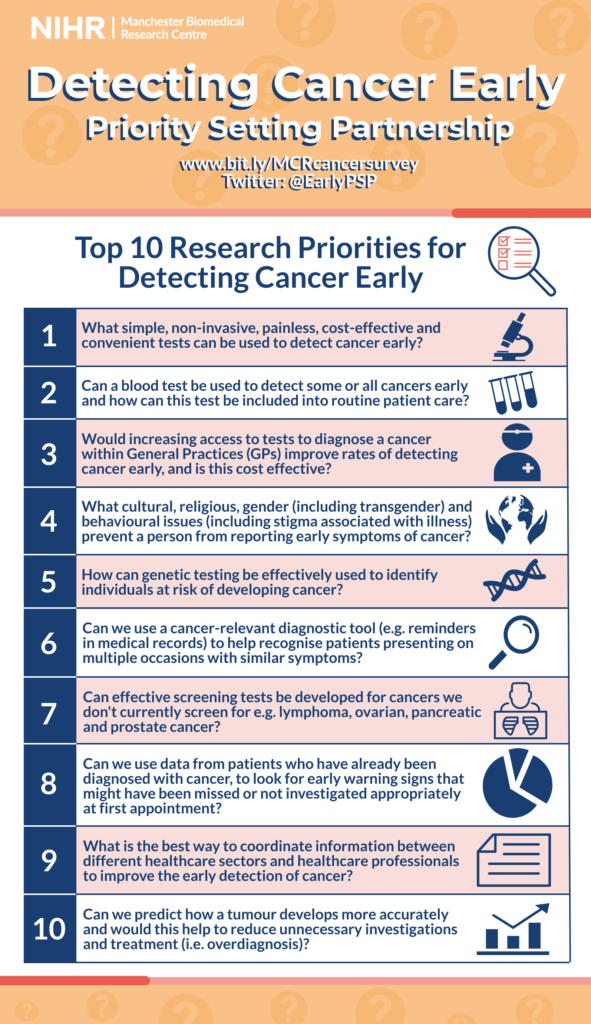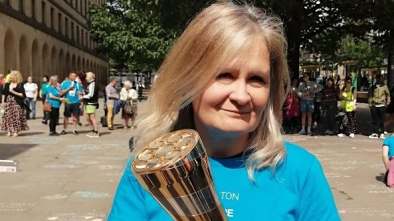David, from Dobcross, helps set top ten priorities for detecting cancer earlier
A Saddleworth cancer patient has helped draw up a ‘Top Ten’ list of unanswered questions to shape future research into cancer early detection and prevention.
David Makin, from Dobcross, worked alongside a group of Manchester cancer researchers, healthcare professionals and other patients and their families to draw up the list at a workshop in September.

Each of the questions address areas with little or no existing research, and aim to help researchers, funding bodies and the biotechnology industry to prioritise their research efforts. The research, published in The Lancet Public Health, used a ‘priority setting partnership’ model developed by the James Lind Alliance, to develop consensus between researchers, healthcare professionals, patients and others.
Research was carried out between June 2018 and September 2019 in the form of two online surveys, followed by the final workshop. David was part of the research steering group throughout this period.
Prior to retirement, David worked in the pharmaceutical industry for over 25 years. He was diagnosed with laryngeal cancer in and underwent treatment at The Christie, where he is now a partner governor. David has worked with several NHS and cancer organisations as a patient representative, and now Chairs Saddleworth and Lees Health and Wellbeing Group.

David said: “The Top Ten questions point to fresh and useful pathways of early detection research which I hope will turn into improvements in care and the saving of lives.
“I had a 15 year ‘relationship’ with my laryngeal cancer and had some insider knowledge which helped me navigate the healthcare system. Most people are not in that position and that is why I have always been an advocate of patients being as fully informed and then fully involved in their care and treatment.
“Over the years there have been massive improvements in treatments when cancer has been detected, but it has been an accepted fact for some time that earlier detection would give even better outcomes. There is a strong case for more focus on research into this area, which should lead to better outcomes for many patients.
“Being part of the steering group was really valuable, both in terms of working with other patients in the group and also seeking ideas and seeing how the wider public felt about this research. Their response showed the levels of concern and confusion around cancer, and a desire for more information and clarity to aid early detection.”
The study was led by the National Institute for Health Research NIHR Manchester Biomedical Research Centre (BRC) and The University of Manchester, in collaboration with the James Lind Alliance.
Professor Emma Crosbie, BRC Early Detection Programme Lead and Professor of Gynaecological Oncology at The University of Manchester, co-led the study with Professor Andrew Renehan, NIHR Manchester BRC Cancer Prevention and Early Detection Deputy Theme Lead and Professor of Cancer Studies and Surgery at the University of Manchester.
Professor Crosbie said:
“Early detection is key to improving outcomes from cancer. The earlier we detect it, the more likely it is we can cure it and reduce the harms of treatment.”
Professor Renehan said: “Cancer early detection research is underfunded compared with funding for cancer treatment-related research, and where this type of research is happening, it is generally in isolation.
“The advantage of the NIHR Manchester BRC is that it brings together a dynamic team of internationally recognised researchers across a number of cancer and cross-cutting areas, enabling earlier cancer detection, matching an individual to the prevention treatment most likely to work for them, and working to help prevent conditions progressing into cancer in the first place.”
Dr Ellena Badrick, NIHR Manchester BRC Cancer Data Scientist and Project Coordinator, The University of Manchester, said:
“The priority setting partnership process is designed to balance the research agenda with those priorities identified by patients and healthcare professionals. Often there is a mismatch between research questions considered important by patients, carers and healthcare professionals and the research performed in early detection.”
Dr Patricia Ellis, James Lind Alliance Advisor, said:
“It was my pleasure to work with the Steering Group as they followed the James Lind Alliance process through to the final workshop. The levels of interest, enthusiasm and engagement across all participants lead to rich and informed debate resulting in consensus on top ten research priorities.”
Further information about the project is available on the NIHR Manchester BRC website.



